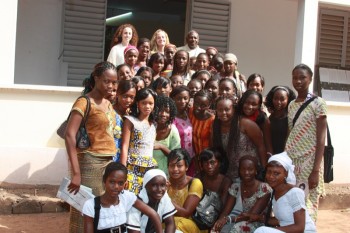Susanna Wing Returns to Mali on a State Department-Sponsored Trip

Wing (top, middle) with students at Lycée Ba Aminata Diallo (Photo by Sekou Keita)
Details
Associate Professor of Political Science Susanna Wing has been traveling to Mali since 1994. She did her Fulbright Dissertation Fellowship there, and much of her research—including her book, Constructing Democracy in Africa: Mali in Transition, which came out in paperback last year—has focused on the West African nation. But when she returned in early October it was not as a student or a researcher, but as a speaker for the U.S. State Department.
Wing was chosen to receive the prestigious Speaker and Specialist Grant, which is given to American experts in a given field to present lectures, serve as consultants or conduct workshops and seminars for professional overseas audiences. She traveled to Mali to lecture on American women and the electoral process.“I was the first speaker that the [new U.S.] cultural affairs officer and cultural attaché had had for their tour in Mali,” says Wing.“They needed somebody who could be a liaison between the U.S. and Mali with the idea of bringing attention to women's involvement in politics, because Mali has upcoming elections in the spring of 2012.”
Wing's 10-day trip, which included a five-day program of two scheduled lectures a day, brought her to the U.S. Embassy in Bamako, the Mali Press House, the Aoua Keita Center for Professional Training, the Malian chapter of the Network of African Women Ministers and Parliamentarians, and, in an especially personally rewarding turn of events, the Centre Djoliba, whose library she had relied on while previously in Mali as a graduate student.
The Centre, says Wing, was the place intellectuals met to discuss the direction of the government after the 1991 Malian revolution.“So in my mind, the heart of Malian democracy is in the Centre Djoliba,” she says.“To have been there as a graduate student doing research, and to come back now in this role and stand there in front of an audience of 60 or 70 people was very personally moving.”
Another trip highlight for Wing was her visit to the prestigious all-girls school Lycée Ba Aminata Diallo, which has educated almost all of the women who currently hold (and have held) significant political positions in Mali. At that meeting with her youngest audience of the trip, Wing was asked by the ambitious students not only how they could become a government minister in Mali, but also how they could become an important member of the United States government.
“The energy that those young kids are conveying—you can see them thinking, ‘I want to run for office'—that's inspiring,” she says.
In Mali, where, according to Wing, only 10 percent of the national assembly is made up of women and only seven mayors (out of thousands across the country) have been women, it was helpful for her audiences to hear that political parity has not been reached in the U.S. yet either.“We have 17 percent women in the Senate and the House of Representatives, and Sub-Saharan Africa as a whole has over 19 percent,” she says.“So they were pleased to see that [as a region] they were outdoing the U.S.”
Though Wing was ostensibly in Mali as a teacher, speaking to the press and government officials as an expert, she also learned a lot, specifically hearing new details about the challenges facing Malian women in the political process. Many told personal stories of harassment and pressure they faced in leading or trying to be elected to lead different groups. Wing also was pleased to discover how much progress the country has made in the 17 years since she first began traveling there.
“In the last four years there's been a great deal of positive, construction-type development,” she says. The country opened a new bridge, its third, during her visit.“There was just one bridge when I started visiting Mali,” says Wing, who also noted an increase in paved roads, overpasses and traffic lights.“That kind of basic infrastructure is a huge change!”
The Speakers and Specialists Program is an important one, not just from an educational standpoint, but because it allows for what Wing calls“cultural diplomacy,” giving Malian people access to regular American citizens for open dialogue. There is no "agenda" per se, just an opportunity to exchange ideas across cultures. For Wing, the trip was also an exciting opportunity to use both her academic experience studying gender in politics and the research on Mali that she first began nearly two decades ago.“It was a wonderful way to bridge my two worlds,” she says.
-- Rebecca Raber



